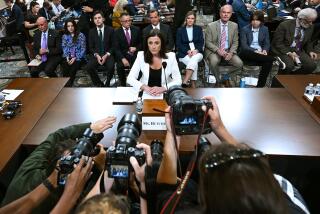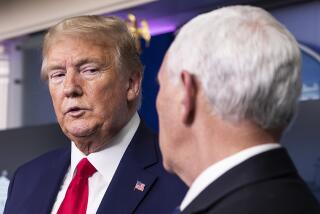North Denial of Aiding Contras Told : Witness Cites ’86 White House Meeting With Congressmen
- Share via
WASHINGTON — Lt. Col. Oliver L. North once denied to a group of congressmen in a White House meeting that he had helped raise money for the rebels in Nicaragua, a congressional staff member testified Monday.
Thomas A. Latimer, staff director of the House Intelligence Committee, said that North’s denials at the Aug. 6, 1986, “informal meeting” followed more-formal written denials from North’s then-superior, Robert C. McFarlane, who was former President Ronald Reagan’s national security adviser.
Several witnesses have established that North, despite his denials, was working actively to raise money for the Contras and to provide them with military advice.
Hamilton Testimony
Latimer testified as a prosecution witness at North’s federal court trial to support testimony given last month by the Intelligence Committee’s former chairman, Rep. Lee H. Hamilton (D-Ind.), who told of receiving misleading letters from McFarlane. McFarlane has testified that the letters were drafted by North at the National Security Council.
Separately, former Rep. Michael D. Barnes (D-Md.), who headed a House Foreign Affairs subcommittee, told jurors that William J. Casey, the late CIA director, visited his office about the same time, apparently in an effort to put a Barnes staff member in a bad light. At the time, Barnes also was questioning the White House about North’s actions.
Talking to Sandinistas
Barnes said Casey charged that staff member Victor Johnson had been talking to representatives of the leftist Sandinista government in Nicaragua, against whom the Contras were waging guerrilla warfare.
In testimony elicited by Brendan V. Sullivan Jr., North’s attorney, Barnes said that Casey’s accusation was “frivolous” because Johnson had properly told the Sandinistas that they must improve their human rights record and permit newspaper offices in Nicaragua to reopen if their government wished to gain favor in Congress.
When asked if Johnson had leaked classified information to the Sandinistas, Barnes angrily told Sullivan: “There was never any allegation that Victor Johnson or any other member of my staff provided classified information in any form to the Nicaraguan government or any other government.”
Sullivan has told jurors that North was following a formal policy of the Reagan Administration to withhold information from Congress about pro-Contra activities because “everyone knows Congress leaks like a sieve.”
The principal charges among 12 felony counts on which North is being tried are that he made false statements to Congress and obstructed congressional inquiries at a time when Congress had outlawed any direct or indirect U.S. military aid to the Nicaraguan rebels.
Poindexter Not There
Latimer said that members of Hamilton’s committee had sought a 1986 meeting with North and John M. Poindexter, McFarlane’s successor as national security adviser. The meeting was in the White House Situation Room, the highly secure “nerve center” of the NSC, Latimer said, but Poindexter did not show up, leaving North alone to answer the congressmen’s questions.
Glancing at notes he had taken at the meeting, Latimer testified that North insisted that “he had not violated any provisions” of the congressional ban and that he had been in touch with Contra leaders mainly to encourage improvements in their human rights program.
Latimer said that North specifically denied that he had been working with Robert W. Owen and with retired Army Maj. Gen. John K. Singlaub to raise money for the Contras.
Both Owen and Singlaub have testified at North’s trial about repeated contacts with North to raise private funds and channel military equipment to the Contras.
Under questioning by Sullivan, Latimer conceded that the meeting was considered “informal” because no transcript was made.
More to Read
Sign up for Essential California
The most important California stories and recommendations in your inbox every morning.
You may occasionally receive promotional content from the Los Angeles Times.













